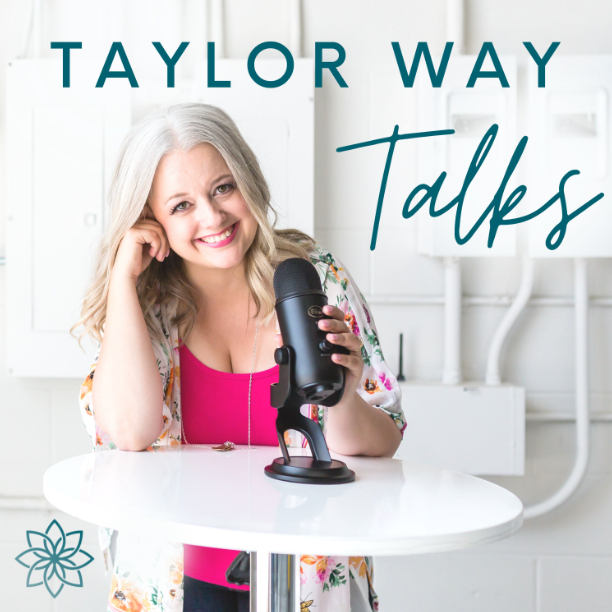
Taylor Way Talks
16 - Janis Melillo: From Parent to Caregiver. Living in the fear of the unknown.
Dawn Taylor|1/30/2023
Content Warning: Traumatic injury, hospitalization, grief.
Dawn Taylor welcomes VA and podcast host Janis Melillo to the show to speak on the very moving subject of how to cope with traumatic situations. Janis’ son, Ryan, suffered a potentially life-threatening brain injury and Janis shares her resultant journey as a parent and caregiver.
The stroke and resulting brain injury that happened to her 34 year old son Ryan occurred just when Janis was feeling very elated and content in her life. She talks about how everything can change in a single moment and the feelings of panic and fear she had as a parent. As Dawn notes, a grown child is still their parent’s child.
Dawn and Janis dive deep into the emotional impact a tragic event has on the family surrounding the injured party, the toll repeated hospitalizations place on the caregiver, why the need to rage and grieve are both important, and how support systems can best help the caregiver through their struggles. Dawn and Janis even address sleep issues and self-care needs. Janis’ raw and open story will resonate with those who can relate and she will make every caregiver feel less alone.
About Janis Melillo:
Janis Melillo is the owner and CEO of her Virtual / Executive Assistant business, TrulyYourVA LLC. She assists and coordinates creative project management (complex and simple) virtually for her clients some of which include: social media content creation and repurpose, ghostwriting, research projects, and so much more.
Janis is also the host of three podcasts, one of which she co-hosts with her sister called Two Sistas.
They share their love of wellness through fitness and nutrition and everything that happens in between! Janis is also a certified health coach and former personal trainer and brings a wealth of knowledge in this regard. She and her sister, Carroll-Sue, broadcast Monday - Friday and will be approaching their 500th episode within the next month or so!
Her business podcast, Truly Your VA with Janis. is centered around all things business related, especially in the online digital world, in which offers simplified solutions for entrepreneurs. She hosts guests on her podcasts who share their expertise and insight on business related topics. Janis is also the morning host of The Morning Brief on the Wisdom Audio App.
And Janis’ 3rd podcast, Stories That Inspire Us, came about after her 34 year old son, Ryan Scott, suffered a life threatening injury. He is doing so well right now and she is blessed and so grateful! Janis wanted a creative outlet to process her emotions as a parent and support her son but also to be an outlet, a foundation for others who wanted to share their stories to inspire others to do the same. She has already had so many amazing guests on her podcast thus far!
In Janis’ spare time, (yes; she does have spare time) she loves to read and write. She is a published Amazon International Best Selling author having co-authored 16 books to-date, 10 of which hit the International Bestsellers List. Most of the other books hit #1 Amazon Hot New Releases. Janis recently turned 60 years old and lives in North Haven, Connecticut with her husband, Gary. Between Janis and Gary, they have 3 children: Brett, Ryan Scott and Alysia.
Resources Mentioned in This Episode:
- Stories That Inspire Us podcast hosted by Janis Melillo
- “P.S. I Made It” by Dawn Taylor
- “Unexpected Moments” by Daisy Paige
—
Dawn Taylor - The Taylor Way: website | facebook | instagram | linkedin
Janis Melillo - Owner/CEO of Truly Your VA LLC: website | instagram | facebook | linkedin | pinterest
Transcript
Dawn Taylor: [00:00:09] Hey, hey, hey. Welcome back to The Taylor Talks, the podcast where we dig deep into things we wish people would talk about. My name is Dawn Taylor, I'm the ass kicker and hope giver of The Taylor Way, and I am your host. I'm so excited to be here. So today on the podcast, we have the amazing Janis Melillo and we are going to dig into the accident that happened to her son when she was at a peak point in her life where life just felt perfect and how it took a really hard tumble down and how to find balance, how to figure out how to deal with that kind of shift in a relationship, how to deal with that when it comes to your spouse, and most importantly, how do you actually get through the rest of your days. So please stick around and hang out with us as we chat. And I hope you really enjoy the show.
Dawn Taylor: [00:01:04] Thank you so much for being here today, Janis. I am a little emotional, being honest, in prep of having this conversation because of my own story. And what we're here to talk about today is how to find balance when dealing with the tragedy. So, Janis, let's go. Let's just dive right into this. Tell us your story and why this is so important to you.
Janis Melillo: [00:01:32] Well, first of all, Dawn, thank you so much for the opportunity to be with you today on your amazing podcast. I'm really excited to share my vulnerability because only with the hopes of, of course, inspiring others. For me, that's what it's all about.
Dawn Taylor: [00:01:52] Absolutely.
Janis Melillo: [00:01:53] Yeah. So Monday, July 19, 2021. Exactly at 1:00 pm in the afternoon. I got up from my desk. I work from home, I'm a virtual assistant and podcast manager. A few other hats. And I was feeling elated because in that moment, life as I knew it was perfect.
Dawn Taylor: [00:02:21] Oh, dangerous moment.
Janis Melillo: [00:02:26] Yes, dangerous moment. I was doing what I love to do. I love being creative. I had these amazing clients and I was a week away from hitting my first five figure month. But in that moment I didn't realize life was changing for my son.
Dawn Taylor: [00:02:48] Tell us about your son.
Janis Melillo: [00:02:49] Well, in that exact moment, my son, Ryan Scott, suffered a stroke. He collapsed, cracked his skull. He started seizing. They lost his pulse, and he stopped breathing in that exact moment that I felt elated. I unfortunately did not find out about my son's accident until 2 a.m. the next morning.
Dawn Taylor: [00:03:19] Oh, my goodness. How old was your son?
Janis Melillo: [00:03:24] He was 33 at the time. About a month before his 34th birthday. And I woke up at 2 a.m.. I'm in that respectable age where I got to get up in the middle of the night. And I remember, of course, glancing at my phone, use it for a light to get to the bathroom, and I was horrified what I saw on my phone. There were several missed calls and then there was this text message from one of my son's friends that said Ryan had a stroke. He's an emergency surgery. Please call me as soon as you get this message. I remember that I screamed. I screamed. And I'm getting the chills thinking about it in that moment because my poor husband was like, What's wrong? Couldn't bear out, I couldn't even talk, I couldn't even catch my breath. And I just handed him the phone and he's like, Oh, my God. So there was, there was about 20 to 30 minutes I was hysterical trying to get a hold of the person. Where is my son? Is he alive? What is it? I was frantic. Absolutely frantic. Did not know what to do in that moment. And then I remember pacing the floor and I was actually wearing my necklace and I just held on to it and I had a moment of clarity. It was as if I hit a brick wall and I said, Wow, okay. You need to get your shit together here and now. You gotta get it together. You have to be strong for Ryan. You have to be stronger than you ever thought possible because this is a defining moment for your son. It is a defining moment for you.
Dawn Taylor: [00:05:38] Your mama bear stepped in.
Janis Melillo: [00:05:41] It did. It really did. I'm in Connecticut. My son's in Philly.
Dawn Taylor: [00:05:46] And how far away are those?
Janis Melillo: [00:05:49] About three and a half, four hours. So we were trying to figure out, of course, the best way for me to get to Philly. Originally, I was going to drive. Everyone's like, No, no, no, you're too emotional. And I agreed. I ended up taking the train. I don't even remember what I packed. I can't even tell you what I packed in, it didn't matter. And I'm so thankful that I have a cousin who lives actually very close to my son and alerted them and his wife and daughters picked me up, brought me to the emergency room. It was earth shattering to see my son hooked up to so many things. Not something that I would want anyone to ever go through. And they weren't sure he was going to make it initially. The first 24 to 48 hours are very critical. And I just remember sitting by his side and saying Ryan Scott, you need to come back to your life. You were blessed. We were blessed. Your dad and I are so blessed to have you. It's not over. You need to come back. And I just kept talking to him. And when I felt I was going to lose my shit, I would walk out of the room briefly. So started the process of his long recovery. Blessed and grateful he made it through. He has an official diagnosis now. Unfortunately, over about a ten month span, he was hospitalized on an emergency basis nine times.
Dawn Taylor: [00:07:51] Oh, my goodness.
Janis Melillo: [00:07:52] So a lot of going back and forth. Hey, Ryan had an emergency. You need to get down here. Oh, my gosh. I can't even begin to describe as a parent feeling that, feeling helpless. Like absolutely helpless. His official diagnosis now is PTE with a TBI, which is post traumatic epilepsy with a traumatic brain injury. He had, he does have some brain damage on the left, which we knew that he would but I am blessed that he is not he's not as all the ugly things they were telling us he was going to be. He does have some issues and I don't discard those. We can't.
Dawn Taylor: [00:08:44] No, for sure.
Janis Melillo: [00:08:47] We're learning how how to deal with them. And it's been a rocky road. And as a parent, it's been extremely difficult. I really have not had a good night's sleep and maybe three or four nights when I just kind of caved in. I said, okay, I'm going to take a melatonin but I wake up in fear. So I think a lot of times I'm still going through it. I pick up my phone and I'm like, Oh, did I get a message? So it's been quite the journey - 12, a little over 12 months now, of course. And that's kind of where we are with that. My hope is, as I mentioned, when I was pregnant with Ryan, I had the opportunity to meet Bishop Desmond Tutu.
Dawn Taylor: [00:09:44] Oh, wow.
Janis Melillo: [00:09:46] Yeah. It was an amazing experience and I will never forget that conversation. And he specifically asked me, May I put my hand on your belly and say a prayer for your unborn child? I said, absolutely. I will never forget that. So as I'm having this conversation with Ryan and I said, don't forget, you are blessed by Bishop Tutu. We've often talked about that. I've, you've got to come back. You need to get your shit together. Come back, Come back.
Dawn Taylor: [00:10:26] So I'm going to pause you for a second. Take a big deep breath. Whew. You are still very in the raw stages of everything that's gone down. And you know, it's interesting, as you were talking, I - so for listeners that know me or have read about my story, they know that I've had a pretty crazy health history. But for those of you who don't. When I was 17, April 7th of grade 12, I had a brain aneurysm. And my boyfriend was driving home from work or basketball or something. And he felt this voice in his head or heard it say, you need to go see Dawn right now. And he walked in and he leaned over to give me a kiss. I was laying on the couch. I was in the middle of making dinner for my family. And I collapsed on the ground, screaming and holding my head. And he had to rush me to the hospital. And the whole story is in my book that you can find on my website or on Amazon. It was so, it's interesting hearing you talk about it from the parent's standpoint and hence the comment on this being weirdly emotional for me too today. Right? Is, I was the child in that situation who was almost an adult. Right? Your son was already an adult. But, you know, I was this child who was this teenager who was being rushed to the hospital and they were trying to find my parents and they had to medevac me out to another city an almost 19 hour drive away. And they said I wasn't going to survive. And like all of the, all of the crazy around that and the fact that one in 750,000 people survived a brain aneurysm at that point, and I somehow survived. And out of that one in there was - sorry, numbers, I'm like emotional - 50% chance I would die of a second one within ten years. And my doctor had said, nobody makes 20. And April of this year was 24 years.
Dawn Taylor: [00:12:43] And so, you know, when they say these statistics and they say these numbers and people always go, Dawn, why would they have said that to you? And, you know, it wasn't the doctor's fault. In no way do I blame the doctor. I sat in his office as a grown adult about a year after, and I said, I need to know numbers. I need to know medical statistics because I need to know this prior to getting married, prior to having kids, prior to continuing my life, prior to all of these things. Like I need to know what I'm looking at. And with tears in his eyes, he told me the numbers. And it changes so much moving forward. But I can't imagine what my parents went through in that. And I know my mom for months after had to wake me every 4 hours to give me medications. And it was funny because I remember laying in bed one time and she's trying to wake me and I was sound asleep. I was 18, I was asleep. I had just fallen back asleep after the previous meds. And she freaked out. She panicked because she couldn't wake me up. And I was like, No, lady, it's like two in the morning, I'm tired. But like, I remember that sheer panic in her voice and in her face when I finally opened my eyes. And any time I'd have a headache, any time I'd act different, any time anything weird happened, she'd rush me to the hospital. She would rush me to emerg thinking I was having a second brain aneurysm.
Janis Melillo: [00:14:13] And for the parent, it's, a very close friend of mine said, You know, Janis, you you need to, like, pause for reflection for a moment. It's okay to be strong when you're with your son, but sometimes you need to let your guard down. Realize that you have been through a traumatic experience. She says You're suffering from PTSD.
Dawn Taylor: [00:14:44] 100%. I agree. And the thing I would add to that is you can also be angry. There is this whole concept right now of toxic positivity. Where we're constantly supposed to find the moment of gratitude or constantly supposed to like, focus on the blessings and focus on the answered prayers and focus on all of those things in a situation. But deep down, we actually really need to get angry and we need to allow ourselves to be mad. We need to allow ourselves to be so mad at what happened and what was lost and what was taken and all of those things and allow ourselves to grieve and process those emotions to before coming back.
Janis Melillo: [00:15:25] And I realize that you're absolutely correct. And one of the things that I realized, obviously I'd mentioned I haven't had a good night's sleep and I really haven't, but when the 19th of the month comes along, I noticed the other day that I felt very pissed off, very agitated. And I thought about it 19th, the 19th. Obviously, I know my son's accident was on July 19. But it happened to also be the second anniversary of my dad's passing. And exactly ten months later was when Ryan had his accident. And I was pissed. I was so mad, Dawn, I would sit around my office and then I just, I kind of, I sat down on the floor and I just bawled my eyes out. I'm like, I'm starting to release it. Although you can't release, you can release some of the, some of the energy. And they say we need to move forward. That's great. How the--.
Dawn Taylor: [00:16:38] -- Fuck. It's okay, you can say it.
Janis Melillo: [00:16:41] All right, fuck, why do that? How do I do that? And I go back to one of Ryan's hospitalizations where I was down there, and he lives with a couple of roommates. So when everything initially happened, my ex husband and I felt safe enough because originally we thought we were going to have to transport him to Connecticut so that I could be there and kind of oversee his care. But we also knew that Ryan is a very independent individual. That's how we brought him up to be. And we had these conversations of what would Ryan want? What is in Ryan's best interest? What can we do? Me being in Connecticut and Jerry, my ex-husband, being in Florida. So it was really those difficult conversations. What is in Ryan's best interests? We know that he would want to be where he is. He loves that area. That's part of who he is. Ok, well that's great. How are we going to oversee his care? Ok, well, my ex-husband could fly out. I can drive. But what we did not expect was nine hospitalizations within just about 11 months. That's basically for Ryan being hospitalized like every six or seven weeks or something. Back and forth, back and forth. It took a very heartfelt emotional toll on everyone involved. But we knew that to the extent that we could, we had to honor what we know Ryan would want. And he has the ability now. He can make his own decisions. We have noticed, of course, with the traumatic brain injury that he's very forgetful. He shakes his hands. He was trying to give me something and he was like this...
Dawn Taylor: [00:19:06] Yeah. Just shaking his hands.
Janis Melillo: [00:19:08] Yes. So there's things that we have both picked up on and he's aware that he's doing that. And he says, Mom, isn't this ridiculous? I'm 35 years old. This is effed up. I can't believe it. I'm like, and he just kind of went off and he says, Oh, I'm so sorry. I'm like, first of all, you don't need to apologize. You have every right to feel the way you're feeling, you know? You have to continue being you to the extent that you know what you can be. You have so much more to give. He loves helping people. And to that extent, he will continue to do that as much as he possibly can. He does realize that he, you know, for instance taking his medication, he says, You know, what am I going to do? I don't want to have to carry around a pill thing. I don't want to do this. And I said, Well, Ryan, before any of this happened, like when you're leaving for the day, you know, you going to be out all day. Do you take anything preventative like that's in your bag? Like, do you maybe bring some Kleenex? Do you maybe bring...
Dawn Taylor: [00:20:29] A granola bar?
Janis Melillo: [00:20:31] Granola bar, cell phone, Advil, and you put things in your bag that you know you are going to need? He's like, well, yeah, duh. Don't give me that duh, I'm still your mother. And I said, Well, why don't, you always have your cell phone on you? Why don't you set two timers on your phone and that way, and do a backup timer for each one? So if you're taking your medicine, I forget what it is, 8 a.m.. So you set one at 8 a.m. and then you set it at 8:05 in case you're in the middle of something. It happens to the best of us, we forget.
Dawn Taylor: [00:21:11] All the time.
Janis Melillo: [00:21:12] And he's like, Oh, my God, that's a really good idea. So he's very aware of that. He even took the initiative to get one of those dog tags that says that he has epilepsy and the different medicine that he's on. And I said to him, Ryan, you know - and I just got back from Philly last week. I had to take him to the neurologist - and I said, Ryan, he was kind of bitching about everything that had happened, and I can't do this, I can't do that. And I'm like, Well, think about the things that you can do. You still can help. I know how you like to volunteer your time. You know, you're still doing the things that you love to the extent that you can. So you're, the possibilities are endless. And he kind of thought about that. And he said, You know what? You're right. And I said, Well, it's not about me being right. It's about what is right for you and your lifestyle. This is where you want to be. This is where you're going to stay. This is your home.
Dawn Taylor: [00:22:24] Let's talk about how different it is when it's not your child, but it's your child. Do you know what I mean? He is your child, but he was also a 33 year old grown man.
Janis Melillo: [00:22:36] Yes.
Dawn Taylor: [00:22:37] And tell me you didn't see him as a five year old all over again and you want to rush in and just take care of him and do all of those things. But he's a grown man.
Janis Melillo: [00:22:50] Yes, he is a grown man. And when he was to that point where he could understand conversations, he was in ICU for two weeks and then was in the stepdown ICU for a couple days, and then they transferred him to a TBI center. And we had to have, my ex-husband and I had to have those tough conversations with him about we need to know what your wishes are as far as, God forbid, another episode happens. Like we need to know how you would want us to proceed. We know how we would proceed, but we need to know what you would want. And he kind of looked at us and he was like, he said, Are you trying to ask me something? But you're not really coming out.
Dawn Taylor: [00:23:44] You're like, Yes, yes, we are.
Janis Melillo: [00:23:48] I said, Yes, Ryan, if something happens to you and we have to make a life decision on your behalf, we have to know what your wishes are. And as I was saying that and as I'm saying it right now, I feel my eyes start starting to well up, because that is never a question I had ever anticipated asking my son ever.
Dawn Taylor: [00:24:21] Oh, no, there's this there's an interesting hierarchy to this. I just finished training to become a certified grief facilitator to help with clients that are grieving as well as everything else as a trauma specialist in doing what I do for work. And it was interesting because they talked in it about how like death isn't random and it's not personal. And he said that a lot. And he's like, only in North America do we have a concept that death is supposed to go in a specific order or even like a massive health issue. Like, obviously mom and dad should have the health problems before the child. Like, you should never have to think about those things. And one of the things that popped up for me on today's topic was I think parents with adult children need to have these conversations.
Janis Melillo: [00:25:17] They do, especially if their adult child is not married.
Dawn Taylor: [00:25:22] Oh, absolutely.
Janis Melillo: [00:25:24] The parent or parents should be aware or should have that conversation with their child, adult child, just in case there is an emergency. I think it would be a good idea. Of course, we don't want one to happen, no parent.
Dawn Taylor: [00:25:40] Oh gosh no.
Janis Melillo: [00:25:42] But you sign a health care surrogate designation or something of that nature, and I'm sure it's called different things in different places.
Dawn Taylor: [00:25:52] In Canada its a power, I think it's a power of attorney.
Janis Melillo: [00:25:55] Yeah. So and a durable power of attorney just in case we need to act on your behalf.
Dawn Taylor: [00:26:04] Totally. Well, and have those conversations. Have those conversations. Do you know how many kids... I remember talking to a friend and I was like, I was like, Oh, yeah, I have a file. And she was like, What? And I said, I have a file. It's literally labeled 'If something bad happens, you need this file' is written in giant wording on it. And there's a few people in my life that know exactly where it is in my filing cabinet. But in it is like, No, no, no, these are my wishes. Like, if something happens, here's the will, here's the power of attorney, here's, right, here's all of it, here's all of the stuff, all of the insurance, all of the different forms you might need. But with that, here's also my wishes on where I would want to be buried. Do I want to be resuscitated? Do I want to be kept alive on life support? Do I, like what do my husband and I want? And she was mortified that I had this file. And I said, Yes, but, we need this also of our parents so that we know what's going on. But there's such a fear, right? There's such a fear of like death and talking about death and talking about health issues and talking about these struggles that I feel like we've shut off this entire portion of life and we have this unrealistic expectation or idea. I mean, come on, we're all going to just live till we're 105, perfectly healthy and nothing bad is ever going to happen. And it's all going to be smooth. And that's not realistic.
Janis Melillo: [00:27:37] It's not and life is not smooth sailing. And the unexpected will eventually rear its ugly head. Maybe not to me directly. This happened to my healthy 33 year old son who is a vegan, who is very healthy, who is very vibrant, who basically rode his bike all around downtown Philly. He's not a couch potato. I just couldn't. And in many respects, I still cannot reconcile...
Dawn Taylor: [00:28:24] That it even happened.
Janis Melillo: [00:28:25] It's just, it blows my mind.
Dawn Taylor: [00:28:27] So one other question, I want to ask you about this, is how has it affected your marriage? I mean, there's the whole you've had to deal with your ex-husband probably more than you ever care to want to over the last 15, 16 months because you're dealing with your son's health care. But what about your current husband? How has it affected you guys?
Janis Melillo: [00:28:49] He has been my rock, truly has been my rock. When I screamed that morning, he's been so supportive. He's semi-retired. He, obviously there has been a huge financial associated with everything that has happened. And he has just been working his ass off in case something happens, because we've been in that mode where there's been nine emergencies and he's been my rock, so supportive. I remember when I first got to Philly. And once I initially saw Ryan, was able to talk to the doctors and the nurses and I just had to get out of there for a few minutes. And when they said Ryan is critical, we're not sure what's going to happen. And I remember kind of, I didn't like really bang my hands on the counter, but I was like, I was crying. I'm like, What do you mean you don't know, what what does that even mean? What does that even mean? Talk to me in English. Was adamant. I wanted questions right then and there. So I'm like, okay, I need to remove myself from the situation, they're trying to help me. They knew that I wasn't mad at them.
Janis Melillo: [00:30:19] I was, of course, I had to communicate with my ex-husband. So I remember walking out and calling my husband. Giving him an update. And I said, You just need to stand by. He says, Just know that I'm standing there right with you and I'm giving you the biggest hug that I can possibly give you right now. He was devastated, absolutely devastated. And we were supposed to go to, my last name is Melillo. I live on Melillo Circle.
Dawn Taylor: [00:30:55] Oh, wow.
Janis Melillo: [00:30:56] Everybody who lives on a little circle is a Melillo, except for three, three, nine houses now. And they, the family gets together every now and then, has a little party and his, one of his cousins came over and they said, oh, you know, don't forget. And he had been crying. And they said, What's going on? You know, I saw you leaving with Janis, everything ok? And explaining to everyone what was going on, and I know I'm kind of answering this in a roundabout way, but Gary is my rock. And in that moment, I am so thankful that he had his family around him to support him.
Dawn Taylor: [00:31:37] Well, that's a piece of this, too. That's really interesting is as the caregiver, as the mom, as the parent, as the caregiver, who is your support? Who are your people to support? And then that has to go down layers. So he needs the support so he can support you, who needs the support so you can support your son...
Janis Melillo: [00:31:59] Right.
Dawn Taylor: [00:32:00] We totally just internalize. We barrier ourselves. I had somebody say to me one time, I hadn't shown up for something very often and they came up to me and they're like, Oh, wow, nice seeing you around. And I said, Or the question you could ask is, is everything okay, we haven't seen you around much. And he just kind of looked at me and I just turned around and walked away. But I know for myself when I'm going through a struggle with a loved one, right? When my husband is sick or when situations in my life have happened, I cocoon. I don't reach out and ask for help. I don't reach out and talk about it. I don't reach out and do any of those things. I grab onto any and all control that I can and I pull it all in. It's like I need control. So I'm going to just like, go completely isolated. Because that's where I know I can control the outcomes in the situation.
Janis Melillo: [00:33:01] You know, you said it so eloquently because people don't know what you're going through. This past summer, we were at a birthday party celebration and we were expecting to meet some friends there. And I got a call, Ryan's in the hospital. So I said, Well, I want to enjoy this time with my husband, but I have to obviously tend to this because I'm Ryan's proxy or whatever. And I went in the car, had the conversation with the doctor, came back and got another call from the doctor. So I was going back, back and forth. And then I felt myself getting very emotional again. And I came in and I said to my husband, I hope you don't mind, but I've got to go. I can't. Because then everyone's like, Oh, what's going on? What's going on with Janis? Did she have too much to drink?
Dawn Taylor: [00:34:08] You're like, Yes, yes, I'm a drunk and I'm hiding in a car right now, so I'm going to go home and cry.
Janis Melillo: [00:34:13] Yeah, I'm doing shit in the car by myself. So he said, not a problem. You know, obviously there was some Melillos there. So he knew he could get a ride home. One of our friends that we were supposed to meet, and the wife said, or somebody said, Well, I haven't seen Janis around, like, what's going on? And he just, he took it - I don't want to say offensively, that's not what I mean at all - and he said she, you know, Ryan's in the hospital again. She was going back and forth to the car and this is somebody else's party. So everyone knows what happened to Ryan. So she didn't want the focus to be on her like, oh my God, what's going on with Ryan? Nor could she handle that. That's not what she would want. That's not what her son would want. So when people see me step away, they, I don't get that approach anymore I guess is what I'm trying to say. It's, so, yeah, I put myself in a cocoon because quite frankly, I'm exhausted physically and mentally. I'm not going to lie about that. I, that's just what it is for me right now. And to that extent, I am not okay with that. But my focus is my son. And my hope is that through all of this, at some point, I know I will get a good night's sleep.
Dawn Taylor: [00:35:49] Can I make a recommendation on the sleep thing? Because I've been there. If you're waking up around 2:00 in the morning to check your phone to make sure he's okay, instead of allowing yourself to go till 2:00 for the jarring message, change a ringtone on your phone to something beautiful with really meaningful words for you, to wake you up at like 1:45. And then the alarm, when you look at the words, have it to be like, God's got him, everything's going to be okay.
Janis Melillo: [00:36:18] Oh my God, that is so beautiful.
Dawn Taylor: [00:36:21] Because what that can allow your brain to do is instead of waking up in that panic state, so now your heart is racing and your body's going into this, like, PTSD trauma response, instead, it's just like this beautiful waking you have to remind you that it's like, No, no, no, he's okay. He's got people, like, God's got him, he's good. I'm allowed to sleep. And it worked for me at one point in my life when I was waking up every night in that panic mode, is to actually, like, wake myself up instead in a beautiful way so that it becomes something that you can then look at it and be like, Oh, okay, now I can go back to sleep.
Janis Melillo: [00:37:00] Wow.
Dawn Taylor: [00:37:01] Okay? So I'm going to recommend you try that. And please email me and let me know if that works for you.
Janis Melillo: [00:37:06] I certainly will.
Dawn Taylor: [00:37:07] And the second thing is, do you have recommendations for somebody who might be going through this or somebody who gets that phone call or somebody... Is there something - and I'm not going to say what people should do - but do you have like a please don't do this or I mean, either or. But do you know what I mean? Like my biggest was please don't be like, Oh, is everything okay? No, no, not everything's okay. That used to make me so mad.
Janis Melillo: [00:37:38] That is a great question, because when you're in that situation as a parent, the best thing I think they can do is just show their love and support.
Dawn Taylor: [00:37:55] And give tangible ways people could do that.
Janis Melillo: [00:37:58] Well, for instance, Gary had so much support here. Friends would call him, Hey, we're going to take you out to dinner. We know we want to be there for you. Hey, you know, do you need any groceries? Maybe stopping by to drop them off some flowers or even sending them a note? I'm here for you just to listen. I think people have, their intentions are so well and I don't--
Dawn Taylor: [00:38:33] No people's intentions are beautiful. It's just not always what we need.
Janis Melillo: [00:38:38] Exactly. They can show it in other ways. As like I said, Hey, I'm here for you just to listen. Not so much asking a question, but letting them know I am here for you. If you need anything, let me know. And then that person doesn't have to feel... They want to help. And they they don't realize that they just helped in such a way. You know, I, all the messages that I receive. Unbelievable. So the best way you can do that is not to specifically ask a question. How are you doing today?
Dawn Taylor: [00:39:24] Just say I'm here.
Janis Melillo: [00:39:24] I'm here for you. I'm here to listen.
Dawn Taylor: [00:39:29] And one of my favorites, so after the brain aneurysm, my skin color changed, my eye color changed, I missed my 18th birthday, my voice changed, I had doubled my body size, like my body went through chaos in those months after. And so many people were so busy, like staring at me like I was this freak in a wheelchair is how it felt. And I'll never forget the day that, like, my childhood bestie showed up. She just showed up at my parents house with, like, food and some dorky little kid movie, and she cuddled with me on a giant beanbag, and we just, like, cuddled on the chair and watched a movie together. And there was no conversation. There was no talking, there was no nothing. But we giggled our heads off at this movie. And she gave me a hug and she went home. And it was like, oh, my gosh, She treated me like I was normal.
Janis Melillo: [00:40:24] Right.
Dawn Taylor: [00:40:25] She treated me like I was normal. And that was probably one of the most impactful things. After, was having it not be like, Oh, are you okay? But she just, like, it was like nothing. It was like nothing had happened and we were just hanging out.
Janis Melillo: [00:40:44] I think that is so beautiful because I'm thinking of a few instances where shortly after I arrived home and I didn't want to go out in public, but I'm like, No, you need to pull your bootstraps up, go out for fresh air, go to the Hard Hat. Have your favorite martini, whatever it is, and some of the comments. I remember looking at my husband, I gave him that look like I'm going to bitch slap this person. It was like, So you know what's going on with Ryan? Just the way, it was asked, the tone. I'm like, What's going on with Ryan? A lot's going on with Ryan, how's that?
Dawn Taylor: [00:41:34] A little bit. How are you doing?
Janis Melillo: [00:41:36] Yeah. And the important thing to remember is to, you have to take care of yourself as well. You have to make your self care a priority when you are able to do so.
Dawn Taylor: [00:41:54] I heard on a podcast the other day, I forgot what podcast was, but she's friends with Brené Brown and when she was going through a massive trauma in her life, Brené Brown had called her and said Like, now is when you have to, like, righteously practice self care. Like now is when you eat the healthiest foods and you drink all of the water and you make sure you're getting, like going to bed and having the naps and sleeps and everything else. That's when you have to. And I don't know, I personally totally agree with that.
Janis Melillo: [00:42:30] It was in one of my trips back from Philly, Ryan had said to me, and of course I bawled my eyes out. He said, Mama, I can't thank you enough for being here for me. You're always here to help me out. And he says, Don't forget I got this. But I want to remind you of something. You've got to continue to do your thing. You've got to continue to be creative and you love doing what you're doing and you just got to take care of you. Because I kind of need you, mom. That's not verbatim, but that was the gist of the conversation. And as I'm driving back from Connecticut, I mean, driving back from Philly, I remember listening to, thank God I had satellite radio and I was in that line of stations where it's all the news and let's face it--
Dawn Taylor: [00:43:27] Yeah, nobody wants the news right now. Let's be honest. That'll just make you not happy.
Janis Melillo: [00:43:33] And I remember sitting back going, Oh, my God. I just want to hear a story that inspires me. And I thought back to what my son said. And I knew that was divine intervention. Because I started a third podcast.
Dawn Taylor: [00:43:57] Right. Because it's your heart.
Janis Melillo: [00:43:58] It is. It's my heart and it's my soul. And it's giving back in such a creative way as a platform for others. And. Wow.
Dawn Taylor: [00:44:08] Totally.
Janis Melillo: [00:44:10] Yeah.
Dawn Taylor: [00:44:11] Oh, Janis, this has been so beautiful talking to you, I, my mom has since passed away, and I often wish that, now that I've had healing on everything that's been going on and has happened in my life, I wish that I could have that conversation with her to know where her heart had been at and where her head had been at when I was going through that. And I feel like I saw a glimpse of that today. So thank you.
Janis Melillo: [00:44:33] Thank you so much for the opportunity to share a little bit about Ryan and me as his mom and all I would like to say as well is be strong. You're not alone.
Dawn Taylor: [00:44:46] And for anyone listening to this, like there's so many of us out here that get it. And reach out. Reach out to us. So if you've listened to my podcast before, you know I like to end with just some silly, simple, rapid fire questions. I think that it's just a fun way to connect to people in a different way. So let's do this. What is your favorite place you've ever traveled?
Janis Melillo: [00:45:11] Florida.
Dawn Taylor: [00:45:12] Oh, where abouts in Florida?
Janis Melillo: [00:45:14] Vero Beach.
Dawn Taylor: [00:45:16] Oh, it's beautiful there. What, other than road trips to Philly, what do you spend a silly amount of money on?
Janis Melillo: [00:45:28] Yoga pants.
Dawn Taylor: [00:45:30] Do you have a favorite brand?
Janis Melillo: [00:45:32] No.
Dawn Taylor: [00:45:33] And can I ask, how many pairs do you think you have?
Janis Melillo: [00:45:36] Probably about 20 or 25 pairs.
Dawn Taylor: [00:45:40] That's awesome.
Janis Melillo: [00:45:43] Not as much as my shoes, though.
Dawn Taylor: [00:45:45] No, definitely a good collection. What is your secret guilty way to decompress?
Janis Melillo: [00:45:54] Coffee.
Dawn Taylor: [00:45:57] Oh! Ok, how do you take your coffee?
Janis Melillo: [00:45:58] Extra light with half and half and three stevias.
Dawn Taylor: [00:46:04] Very precise. I like it, I do. And what is the purchase of $100 or less that has most positively impacted your life in the last year?
Janis Melillo: [00:46:16] A book that one of my podcast guests sent to me called Unexpected Moments.
Dawn Taylor: [00:46:25] And who is that by?
Janis Melillo: [00:46:27] Daisy Paige.
Dawn Taylor: [00:46:29] We will totally link that in the show notes for anybody listening that wants to find that book. And if you could choose to live anywhere in the world, where would it be?
Janis Melillo: [00:46:39] I would have to say Arizona. I've always wanted to go to Arizona.
Dawn Taylor: [00:46:46] Beautiful. I want to go to Sedona. I've heard it's amazing there. I've heard it's absolutely amazing there. So, listeners. Thank you, thank you, thank you for hanging out with us today. Thank you for spending this time listening to the podcast. I am so honored to be doing it. And on behalf of Janis and myself, we want to thank you for being here. And if you love the show today, please leave a review and share it with somebody that might just be inspired by it or feel comforted by it today. And I will see you back here in a couple of weeks.
Follow the podcast
If you want to receive new podcast episodes automatically, you can follow us on Apple Podcasts or in your favourite podcast app.
Please leave us an Apple Podcasts review
Ratings and reviews from our listeners are extremely valuable to us and greatly appreciated. They help our podcast rank higher on Apple Podcasts, which exposes our show to more awesome listeners like you. If you have a minute, please leave an honest review.






